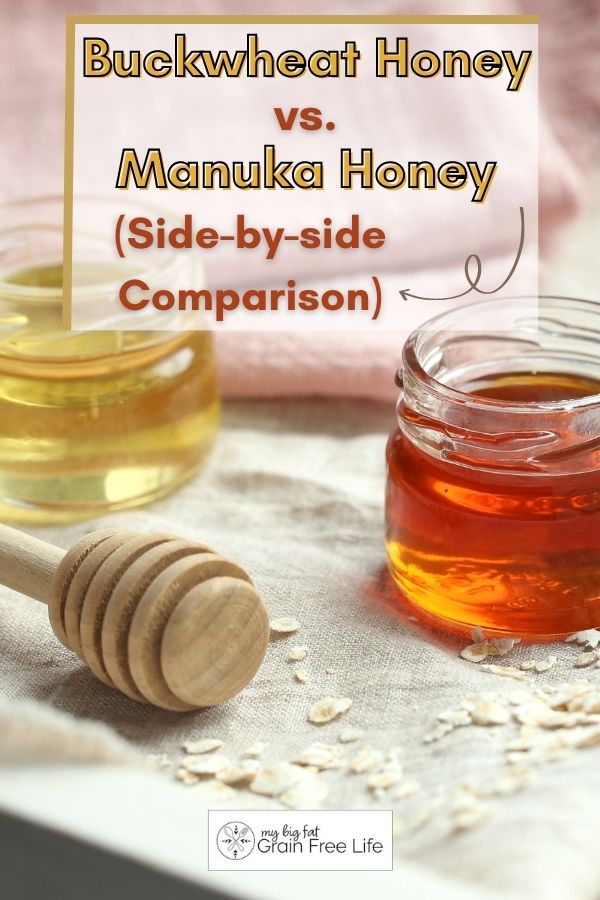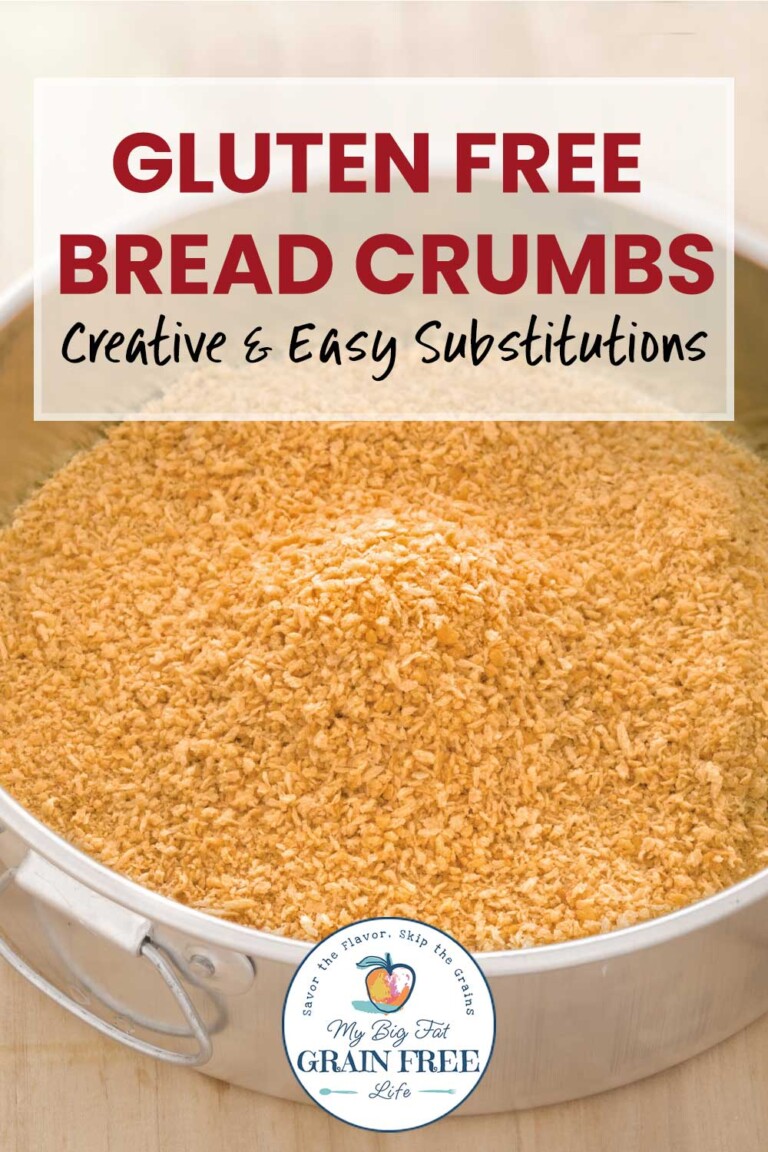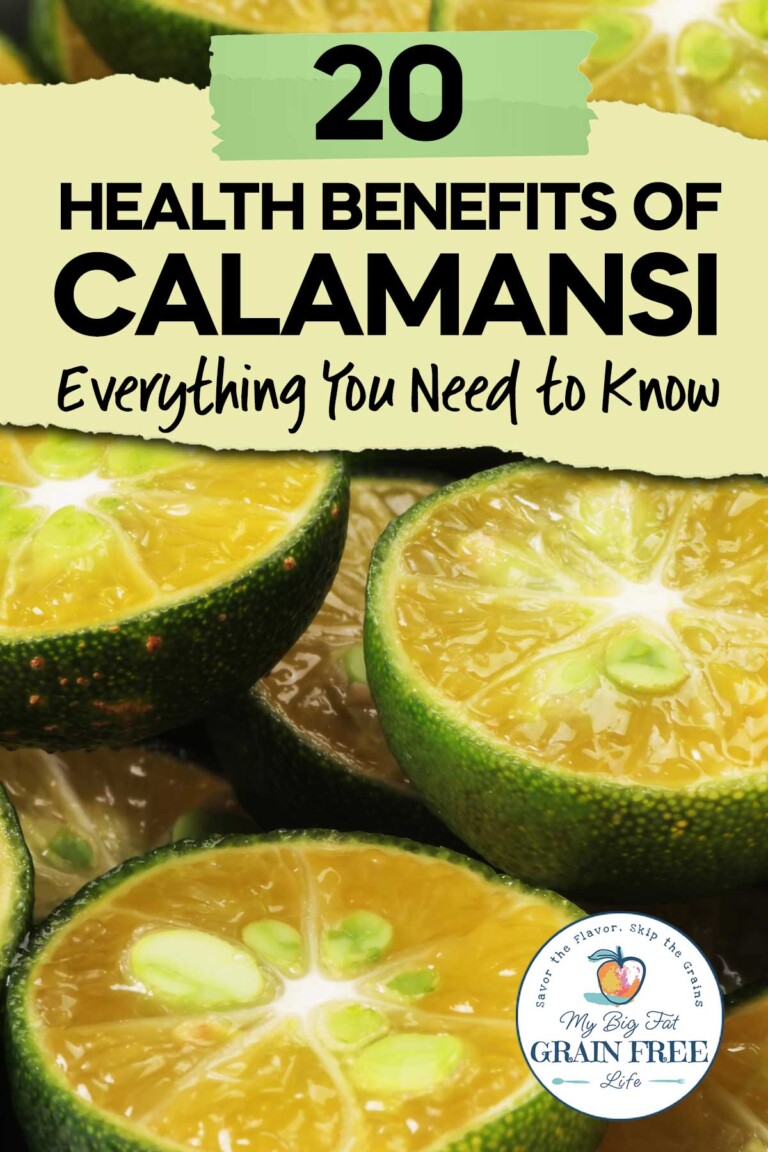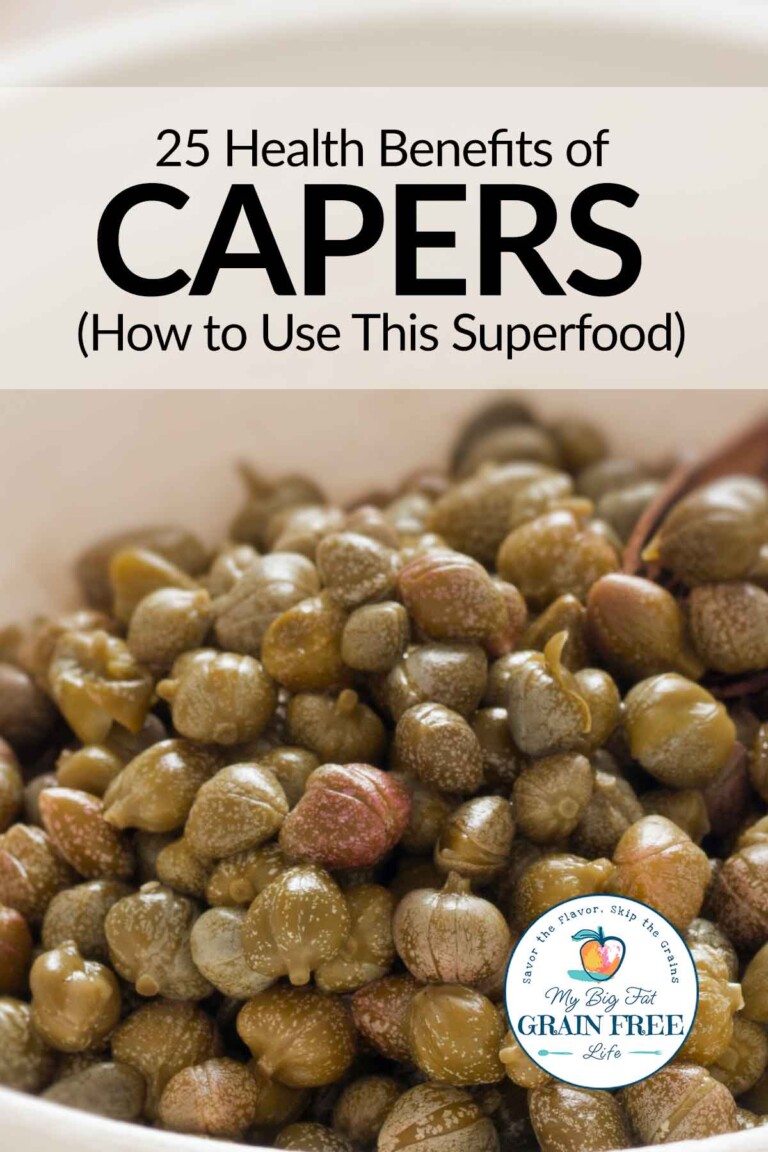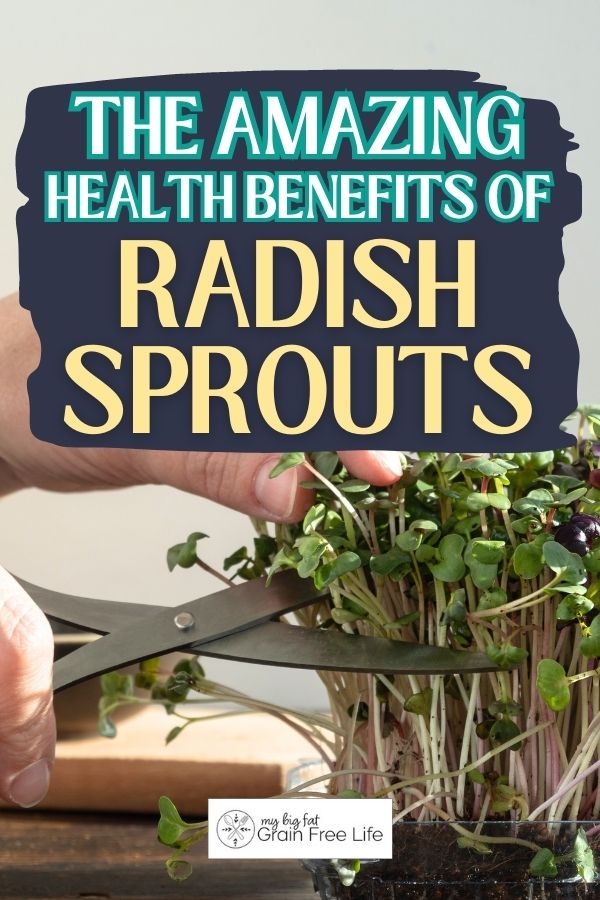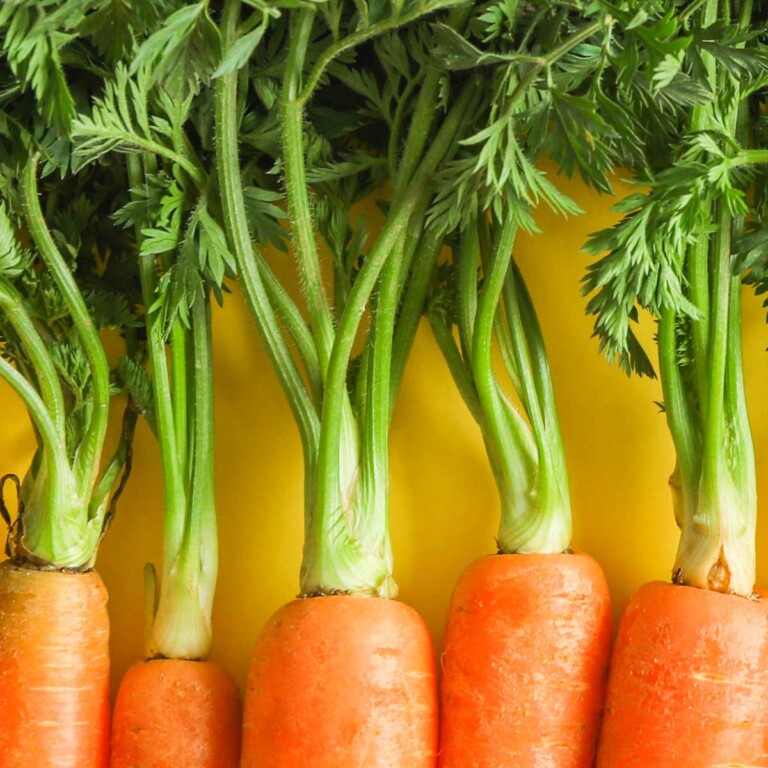25 Health Benefits of Coriander Seeds (Nutrition + Uses)
This post may contain affiliate links. If you make purchase after clicking a link, I may receive a commission at no extra cost to you.
Last Updated on November 29, 2023
Are coriander seeds a part of your diet? If not, let me tell you 25 reasons why they should be! Learn about the health benefits of coriander seeds and different ways you can use them.
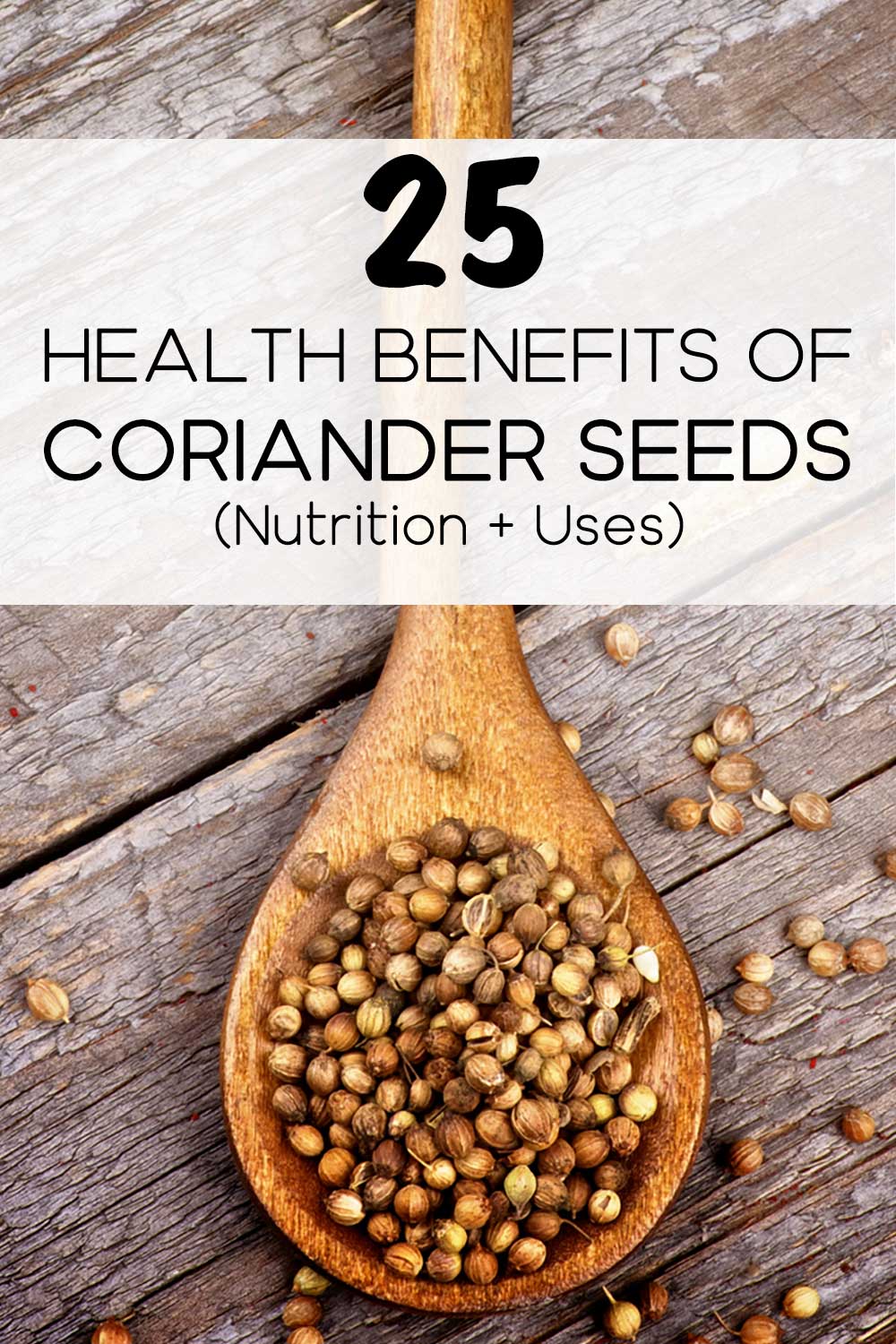
Coriander Seeds
Fresh coriander seeds are a versatile ingredient that can be used whole or ground in both savory and sweet recipes. This aromatic spice is commonly found in blends such as curry powder, garam masala, and pickling spices.
In Indian cuisine, they are frequently used in curries, chutneys, and marinades. In Middle Eastern cuisine, they are added to spice rubs for meats like chicken or lamb.
Whole coriander seeds can be toasted to further intensify their flavor before being used in cooking. This also releases their essential oils that have some great health benefits.
What are Coriander Seeds?
Coriander seeds are the dried fruits of the coriander plant, scientifically known as Coriandrum sativum. They come from the same plant that produces coriander leaves (AKA cilantro), which are commonly used as an herb in cooking.
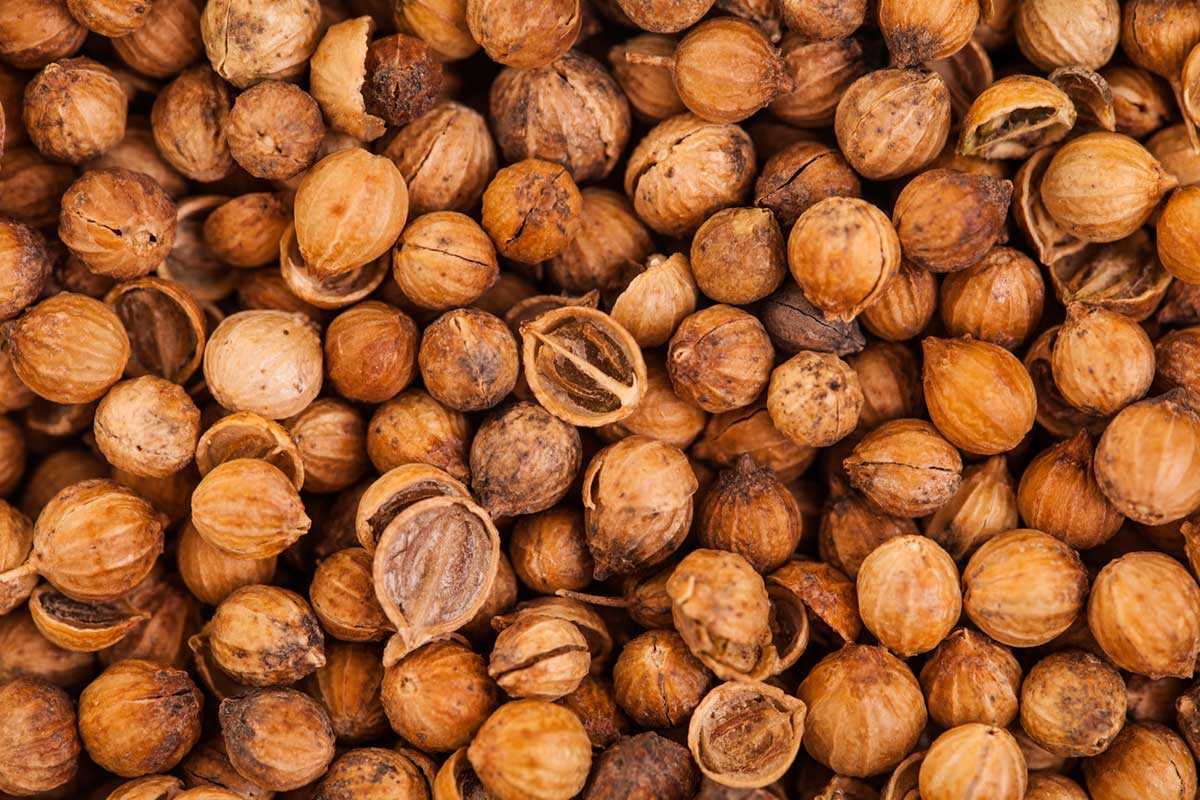
History of and Origin of Coriander
Coriander seeds have a long history of use and are widely known for their aromatic and flavorful properties. The coriander plant is native to regions spanning from southern Europe to southwestern Asia.
It has been cultivated for thousands of years and has been used in various cuisines around the world. In ancient times, the Egyptians were known to use whole seeds for medicinal properties, and they were even found in Tutankhamun’s tomb!
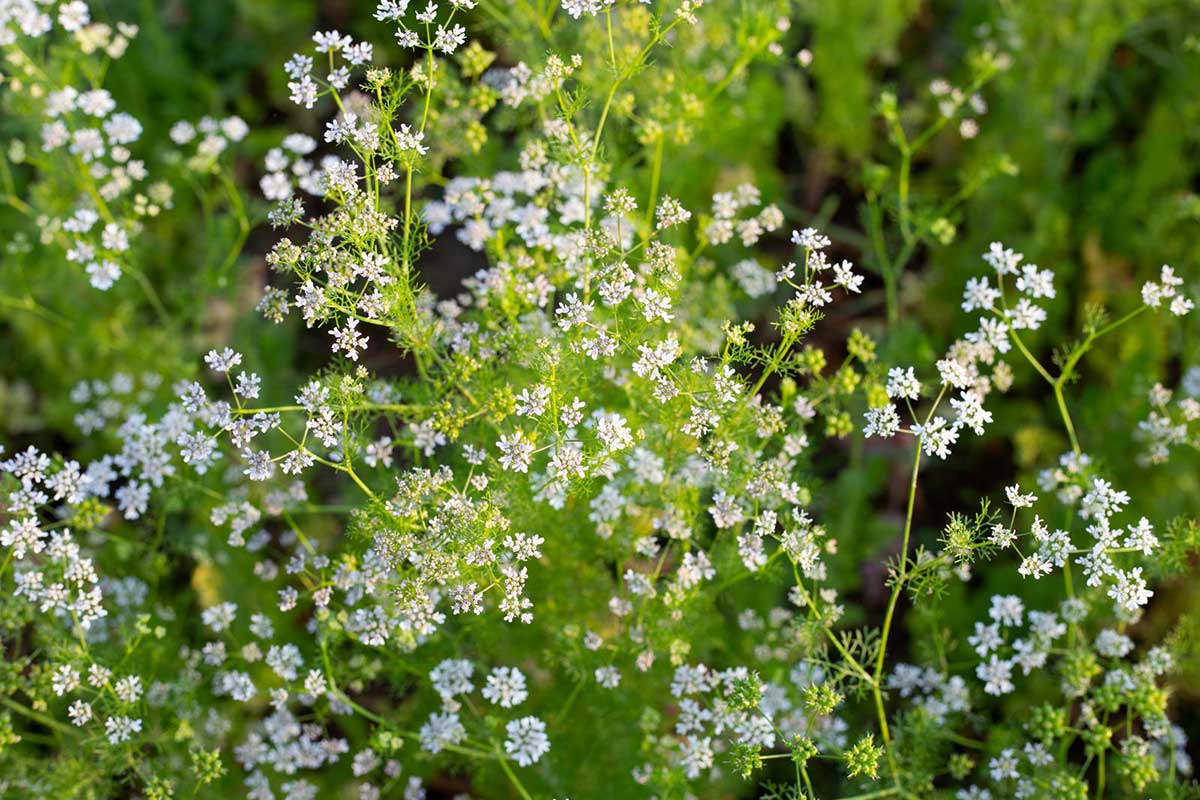
25 Health Benefits Of Coriander Seeds
Some of the health benefits of coriander seeds are quite surprising! Did you know you can chew on the seeds in place of mouthwash to freshen your breath?
1. Aids In Digestion
Coriander seeds contain natural enzymes that promote the digestive system by stimulating the production of digestive juices and enzymes.
2. Helps Reduce Bloating And Gas
The carminative properties of coriander seeds help ease bloating, gas, and indigestion by relaxing the muscles of the gastrointestinal tract. This can also be beneficial for irritable bowel syndrome.
3. May Alleviate Stomach Cramps
Coriander seeds have antispasmodic properties that can help relieve abdominal pain and stomach cramps and reduce discomfort.
4. Helps Improve Appetite
Consuming coriander seeds can stimulate appetite and enhance the overall digestion process.
5. Enhances Nutrient Absorption
The compounds present in coriander seeds can improve the absorption of essential nutrients like iron, calcium, and magnesium.
6. Promotes Healthy Liver Function
Coriander seeds help detoxify the liver by promoting bile production and improving its overall function.
7. Aids In Weight Loss
Coriander seeds can be beneficial for weight management as they increase metabolism and promote fat breakdown.
8. Helps Reduce Cholesterol Levels
Regular consumption of coriander seeds has been shown to lower LDL cholesterol levels (bad) while increasing HDL (good) cholesterol levels.
9. May Help Regulate Blood Sugar Levels
Coriander seeds contain compounds that may help lower blood sugar levels, making them beneficial for individuals with diabetes or at risk of developing it.
10. Anti-Inflammatory Effects
The anti-inflammatory properties of coriander seeds can help reduce inflammation in the body, providing relief from conditions like arthritis or inflammatory bowel disease.
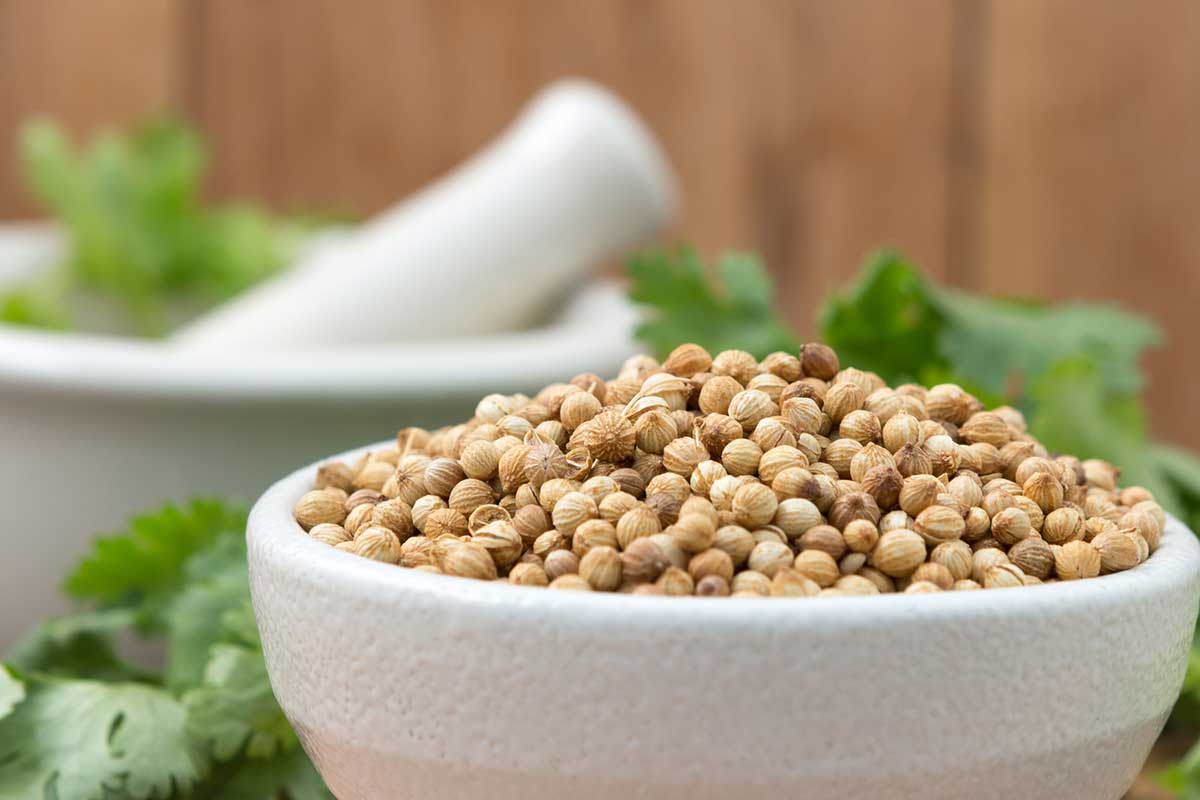
11. Supports Cardiovascular Health
Coriander seeds support heart health and have been found to be beneficial for folks with high blood pressure. The seeds can also help reduce heart rate, and decrease the risk of cardiovascular diseases due to their antioxidant and anti-inflammatory effects.
12. May Boost Immune Function
The immune-boosting properties of coriander seeds can help strengthen the body’s defense against infections and diseases.
13. Improves Bone Health
Coriander seeds are rich in calcium, magnesium, and phosphorus, which are essential minerals for maintaining strong and healthy bones.
14. Offers Relief of Menstrual Symptoms
Coriander seeds have been traditionally used to alleviate menstrual cramps, reduce heavy menstrual flow, and regulate irregular periods.
15. Aids In Respiratory Health
Coriander seeds possess expectorant properties that can help ease coughs, congestion, and other respiratory conditions by promoting the expulsion of mucus.
16. Natural Diuretic
Consuming coriander seeds can act as a natural diuretic, promoting urine production and helping to flush out toxins from the body and reduce water retention.
17. May Help Urinary Tract Infections
One of the key components in coriander seeds is dodecenal, which has been shown to have strong antibacterial activity against various types of bacteria. This compound can help prevent the growth and spread of bacteria in the urinary tract, reducing the risk of infection.
18. Antibacterial Properties
Coriander seeds have antimicrobial properties that may help inhibit the growth of certain bacteria and fungi, supporting overall oral health and preventing infections.
19. Improves Skin Health
The antioxidants present in coriander seeds can protect the skin from damage caused by free radicals and promote a clear complexion for those with skin conditions.
20. May Enhance Brain Function
Some studies suggest that coriander seeds may have neuroprotective effects and improve memory due to their antioxidant content.
21. May Help Alleviate Anxiety Symptoms
The essential oils found in coriander seeds have calming properties that may help reduce anxiety levels and promote relaxation.
22. Supports Eye Health
Coriander seeds contain nutrients like vitamin A and have antioxidant properties that can contribute to maintaining healthy vision and prevent age-related eye diseases.
23. Reduces Bad Breath
Chewing on coriander seeds or using them as a mouthwash can help freshen breath by neutralizing odor-causing bacteria in the mouth.
24. Anti-Cancer Potential
Some compounds found in coriander seeds have shown promising anti-cancer effects in studies, although more research is needed in this area.
25. May Improve Sleep Quality
The natural sedative properties of coriander seeds may help promote relaxation and improve the quality of sleep.

Nutrition Facts of Coriander Seeds
Take a look at the vitamins, minerals, antioxidants, micronutrients, and phytonutrients found in coriander seeds.
Vitamins in Coriander Seeds
Coriander seeds are a good source of vitamin C, vitamin K, and small amounts of vitamin A. Vitamin C is an important antioxidant that helps boost the immune system and protect against free radicals. Vitamin K plays a crucial role in blood clotting and bone health.
Minerals in Coriander Seeds
Coriander seeds contain essential minerals such as iron, magnesium, manganese, and calcium. Iron is important for the production of red blood cells and oxygen transport. Magnesium supports nerve function and maintains normal heart rhythm. Manganese aids in metabolism and bone development. Calcium is vital for strong bones and teeth.
Antioxidants in Coriander Seeds
Coriander seeds are rich in antioxidants such as flavonoids, phenolic compounds, and vitamin C. These antioxidants help neutralize harmful free radicals in the body and protect against oxidative stress.
Micronutrients in Coriander Seeds
Coriander seeds contain micronutrients like copper, zinc, and selenium. Copper is involved in the production of red blood cells and collagen synthesis. Zinc plays a role in immune function and wound healing. Selenium acts as an antioxidant and supports thyroid health.
Phytonutrients in Coriander Seeds
Coriander seeds contain phytonutrients like terpenes (such as linalool) and phenolic compounds (such as quercetin). These phytonutrients have anti-inflammatory properties and may help reduce the risk of chronic diseases.
Flavor of Coriander Seeds
Coriander seeds have a warm, nutty, and slightly citrusy flavor. They are often described as having a subtle sweetness with hints of lemon and sage. When crushed or ground, the seeds release their aroma and enhance the overall flavor profile of dishes.
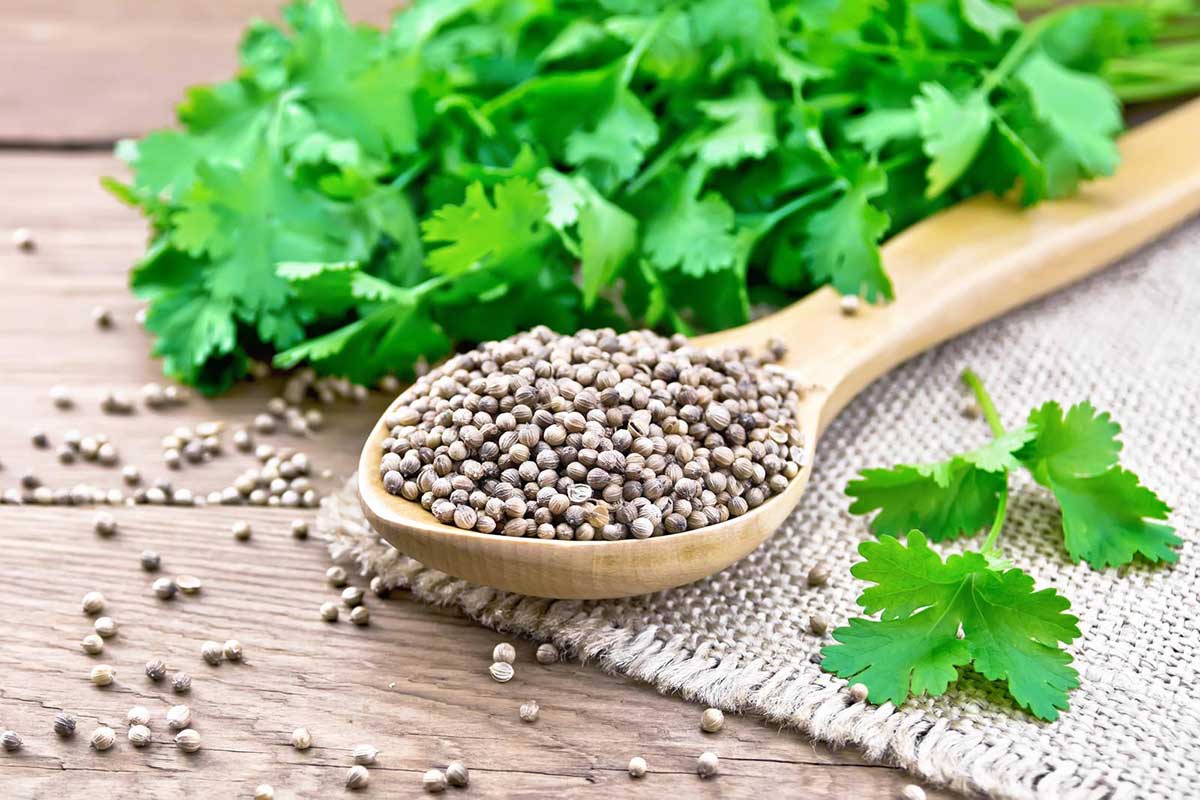
Coriander Vs Cilantro
Cilantro and coriander are two terms that are often used interchangeably, but they actually refer to different parts of the same plant. Coriander typically refers to the seeds of the Coriandrum sativum plant, while cilantro refers to the leaves and stems of the same plant.
Coriander Seeds: The seeds have a warm, citrusy flavor with hints of nuttiness. They are commonly used as a spice in various cuisines around the world. The seeds can be ground into a powder or used whole in both sweet and savory dishes.
Cilantro Leaves: On the other hand, cilantro leaves and stems have a bright, fresh taste with a distinctive pungent aroma. Cilantro is widely used in many dishes, particularly in Mexican, Indian, Thai, and Middle Eastern cuisines.
How to Use Corinader Seeds for the Health Benefits
To use coriander seeds for their health benefits, follow these steps:
- Purchase high-quality coriander seeds from a reputable source.
- Store the coriander seeds in an airtight container in a cool, dark place to maintain their freshness and potency.
- When ready to use, measure out the desired amount of coriander seeds.
- Dry roast the seeds in a pan over low heat for a few minutes until they become aromatic. This process enhances their flavor and releases essential oils.
- Allow the roasted coriander seeds to cool, then grind them into a fine powder using a spice grinder or mortar and pestle.
- Incorporate the ground coriander powder into your cooking.
- Alternatively, you can make coriander seed tea by boiling one teaspoon of ground coriander seeds in one cup of water for about 10 minutes. Strain the coriander water and enjoy the warm herbal infusion.
Ways to Cook with Coriander Seeds
- Grinding: Grind coriander seeds into a fine powder using a spice grinder or mortar and pestle. This powder can be used as a seasoning in various dishes.
- Roasting: Dry roast coriander seeds in a pan until they turn slightly brown and release their aroma. These roasted seeds can be used as a garnish or added to spice blends.
- Infusing: Add whole coriander seeds to oil, vinegar, or water and let it sit for a while. This infuses the liquid with the flavor of coriander, which can be used in vinaigrettes, marinades, or drinks.
- Tempering: Heat oil in a pan and add whole coriander seeds along with other spices like cumin and mustard seeds. Temper this mixture and use it to enhance the flavor of beans and legumes, root vegetables, or rice dishes.
- Pickling: Combine coriander seeds with other spices like mustard seeds, fenugreek, and chili flakes to make pickles.
- Baking: Crush coriander seeds and mix them into bread dough or pastry crusts for an earthy flavor twist.
- Tea infusion: Steep crushed coriander seeds in hot water along with other herbs like ginger or mint to create a refreshing herbal tea that aids digestion.
- Curry pastes: Blend coriander seeds with other spices like cumin, turmeric, and chili peppers to create homemade curry pastes that can be used as a base for various curries.
- Spice rubs: Combine ground coriander seeds with other spices like paprika, cumin, granulated garlic, and salt to create flavorful rubs for meat, fish, or vegetables before grilling or roasting.
- Chutneys and sauces: Add ground coriander seeds to chutneys, sauces, or dips for a tangy and aromatic twist. It pairs well with ingredients like coconut yogurt, mint, lime, and garlic.
Potential Side Effects of Coriander
While coriander seeds offer numerous culinary benefits, it is important to note that some individuals may experience potential side effects when consuming them. Some people may have allergic reactions or sensitivities to coriander seeds, resulting in symptoms such as skin rashes or digestive issues.
Furthermore, excessive consumption of coriander seeds may lead to an upset stomach or diarrhea for certain individuals.
Fun Facts About Coriander Seeds
- They have been used for centuries in traditional medicine to aid digestion and treat various ailments.
- In some countries, coriander seeds are also known as cilantro seeds or Chinese parsley seeds.
- The Egyptians were among the first to cultivate coriander plants for both culinary and medicinal purposes.
- In ancient Egypt, coriander seeds were found in pharaohs’ tombs as they were believed to have healing properties.
- The use of coriander seeds dates back to ancient Sanskrit texts from India, where they were considered sacred.
- Ancient Greeks used coriander seeds in their perfumes due to their pleasant fragrance.
- In many Indian households, roasted coriander seeds are chewed after meals to freshen breath and aid digestion.
- Coriander seeds are often used to flavor spirits such as gin and certain liqueurs.
- The essential oil derived from coriander seeds is used in perfumes, soaps, and cosmetics.
Final Thoughts
In summary, coriander seeds are not only a flavorful addition to various recipes but also offer numerous health benefits. From reducing inflammation to promoting digestion and supporting bone health, these tiny seeds can be a great addition to a healthy diet.
Sources
- https://www.webmd.com/vitamins/ai/ingredientmono-117/coriander
- https://pubmed.ncbi.nlm.nih.gov/33477662/
- https://www.ncbi.nlm.nih.gov/pmc/articles/PMC10220854/
- https://www.lybrate.com/topic/how-to-stop-heavy-bleeding-during-periods-home-remedies/08609afb5f48e229ec979fccd66227c4
- https://www.herzindagi.com/health/benefits-drinking-pre-soaked-coriander-seeds-in-morning-article-191921
- https://artoflivingretreatcenter.org/blog/spices-that-aid-digestion/
- https://flaevor.com/coriander-seeds/
- https://www.urmc.rochester.edu/encyclopedia/content.aspx?contenttypeid=76&contentid=02013-2


